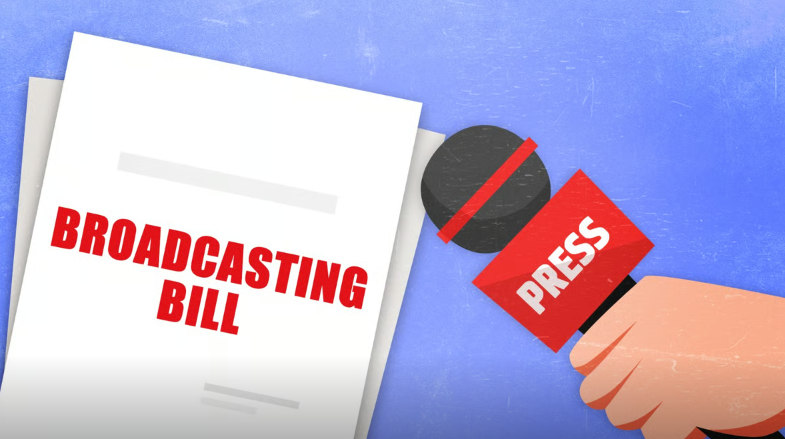Broadcasting Services (Regulation) Bill, 2024 (GS Paper 2, Government Policies)

Introduction
- The Broadcasting Services (Regulation) Bill, 2024, is a significant legislative proposal by the Ministry of Information and Broadcasting aimed at modernizing the regulatory framework for broadcasting in India.
- It seeks to replace the outdated Television Network Act of 1995 and address the rapidly evolving media landscape, including digital news and OTT platforms.
Key Features of the Draft Broadcasting Services (Regulation) Bill, 2024
Definition of Digital News Broadcasters:
- Scope and Coverage: The Bill extends the definition of digital news broadcasters to include anyone publishing news and current affairs content online. This includes:
- News websites
- Social media intermediaries
- Online news portals
- Exclusions: The definition excludes replica e-papers, which are essentially digital versions of print newspapers without additional online content or interactivity.
- Purpose: By broadening the definition, the Bill aims to create a more inclusive regulatory framework that addresses both traditional and digital forms of news distribution.
Code of Ethics:
- Validation of IT Rules 2021: The Bill proposes to incorporate the Code of Ethics from the IT (Intermediary Guidelines and Digital Media Ethics Code) Rules, 2021. These rules, which were temporarily stayed by the Bombay and Madras High Courts, outline ethical standards for online content.
Content Evaluation Committee (CEC):
- Formation: Digital news broadcasters must establish a Content Evaluation Committee (CEC) responsible for evaluating content and ensuring compliance with the ethical standards.
- Registration and Compliance: Creators need to register with a Self-Regulatory Organisation (SRO) and adhere to directives issued by a Central Government-appointed Broadcast Advisory Council.
- Penalties for Non-compliance:
- First Violation: ₹50 lakh fine
- Subsequent Violations (within three years): ₹2.5 crore fine
- Objective: This multi-tiered regulatory approach aims to ensure content quality and accountability in digital news broadcasting.
Regulation of OTT Platforms:
- Classification Change: OTT platforms are now categorized as 'publishers of online curated content,' aligning with the IT Rules 2021. This shift reflects an attempt to regulate OTT content in a manner consistent with existing digital media regulations.
- Content Exclusions: The Bill excludes news and current affairs from the OTT platforms’ regulatory scope, focusing instead on curated content. This distinction helps separate news broadcasting from other forms of digital entertainment.
Reasons for Expanding the Scope of the Draft Bill
Sensational News During 2024 Lok Sabha Polls:
- Issue Highlighted: During the 2024 Lok Sabha elections, independent content creators produced sensational content about government actions and figures, raising concerns about accountability and misinformation.
- Regulatory Response: The Bill seeks to address these issues by establishing a formal regulatory structure for independent creators, aiming to provide a level playing field with traditional media outlets and ensuring responsible reporting.
Amplification by Big-Tech Companies:
- Algorithm Concerns: The role of algorithms in amplifying certain narratives or content over others has been a point of contention. Tech companies argue that their algorithms are designed to reflect user preferences rather than manipulate content.
- Regulatory Measures: The Bill responds to concerns about algorithmic amplification by seeking to implement regulatory oversight on digital content distribution and ensuring fair representation.
Concerns Regarding the Draft Broadcasting Services (Regulation) Bill, 2024
Potential Chilling Effect on Freedom of Speech:
- Criticism of Scope: The broad definition of digital news broadcasters and the requirement for prior registration may be seen as infringing on freedom of speech. Critics argue that these provisions could lead to excessive government control over online content.
- Impact on Independent Journalism: The Bill’s regulatory framework might impact independent journalism by imposing compliance requirements that could stifle diverse viewpoints and content freedom.
Possible Exemptions:
- Selective Regulation: There are concerns that some stakeholders might be exempted from the Bill’s provisions, potentially leading to unfair regulatory practices. This could undermine the Bill’s effectiveness and create disparities in how different players are regulated.
Conclusion
- The Broadcasting Services (Regulation) Bill, 2024 represents a substantial shift in how broadcasting and digital content will be regulated in India.
- By addressing both traditional and digital media, including OTT platforms and digital news broadcasters, the Bill aims to create a comprehensive regulatory framework.
- However, it also raises important questions about the balance between regulation and free expression, and its potential impact on independent content creators and media diversity.
- As the legislative process unfolds, it will be crucial to carefully consider these implications to ensure that the regulatory framework supports both responsible journalism and the protection of fundamental freedoms.


